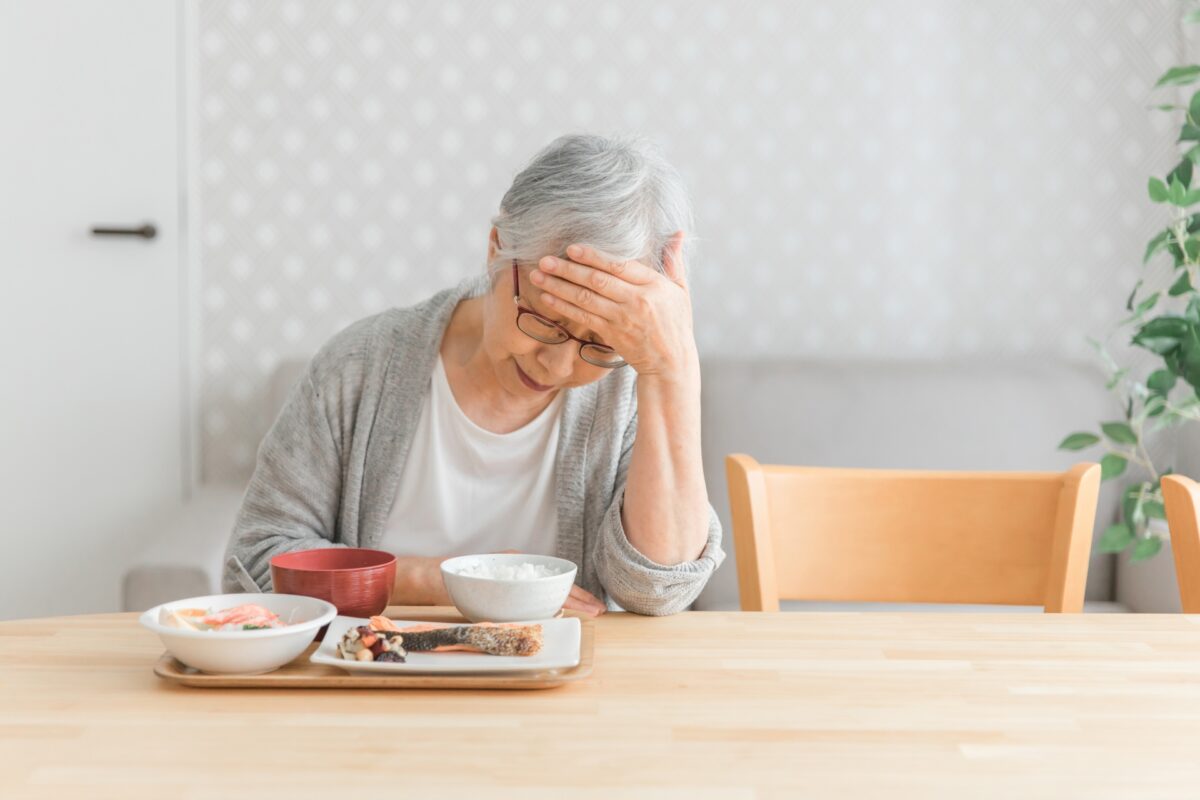Why age and appetite are inversely proportional?
Have you ever felt that your appetite has become thinner, such as your stomach becoming full quickly or feeling heavy? Age and appetite have a close correlation. From age 50 onwards, many people find it challenging to eat the same amount of food as they used to. Why do such changes occur?
The reason why you eat less is that your body functions change with age. Let’s take a look at what changes happen to age and appetite.
Stomach function declines with age.
As we age, the elasticity of the stomach gradually decreases. Decreased elasticity means the stomach does not expand enough when food comes in, so you can’t store much food at once and cannot eat as before.
In addition, since your stomach can’t resolve foods with much oil well, it causes discomfort, such as feeling heavy in the stomach, and people tend not to like rich foods.
In addition, the peristaltic movement that moves food from the stomach to the small intestine also deteriorates, so digestion takes longer. As a result, food stays in the stomach for a long time, and you don’t get hungry immediately.
If too much food remains in the stomach, hyperacidity (excessive production of stomach acid) can occur.
Reflux esophagitis is one of the health concerns you must be especially careful about from age 50.
As we age, the functions of the esophagus as well as the stomach gradually decline. Compared to other organs, the changes are said to be small. Still, the peristaltic movement that sends food to the stomach weakens. The place connecting the esophagus and the stomach closes due to the weakening of the sphincter muscle. It becomes difficult.
On the other hand, as explained above, the stomach is prone to hyperacidity. As a result, stomach acid can flow back up from the stomach into the esophagus. It is the course of how reflux esophagitis happens. It often causes Nausea and heartburn.
Changes in functions around the mouth
In addition to changes in the stomach and esophagus, functions around the mouth also decline with age. One is a decrease in saliva. When saliva decreases, the inside of the mouth becomes drier, and periodontal disease and stomatitis increase. The pain and discomfort associated with it can make it challenging to eat.
And the chewing power also goes down. Muscle strength for chewing and swallowing weakens, and teeth are lost due to tooth decay and periodontal disease, making eating hard foods and choking difficult.
Then, the taste buds (organs that sense taste) on the tongue atrophy, making it challenging to feel tastes. It makes seasoning stronger for older people. When the ability to discern taste declines, the food you used to eat will no longer taste good, leading to a loss of appetite.
The decline in these functions related to eating is a primary reason age and appetite are inversely proportional. However, at the same time as the diet becomes thinner, people in their 50s and older have a lower metabolism compared to when they were young. You don’t have to worry too much about it because you don’t need as much energy as you did when you were younger.
What to do when you’re hungry
When eating becomes thin, reflux esophagitis is likely to occur, which increases the risk of developing esophageal cancer. Improving the state of eating less will be a countermeasure to prevent this.
Specifically, one way to do this is to eat foods that are easy to digest, especially those rich in carbohydrates and amino acids (such as low-oil foods, tofu, etc.). It’s easy to eat even after 50 years old, and it’s easy to eat vegetables.
However, people in their 50s and above lose muscle mass, so we recommend actively eating meats such as steaks containing oil. If you can’t eat it anyway, you should take a lot of soy and fish instead of meat.
Soy is a precious source of protein when you don’t feel like eating heavy foods like meat.
Eat less, but still, be well nourished.
As we age, we will inevitably eat less. However, if you don’t eat much, you will become malnourished, leading to the poor physical condition due to muscle weakness and being too thin. You don’t need to eat over the amount you can, but pay attention to the balance and take the necessary nutrition properly.
To make the meal more enjoyable, we recommend eating it with your family and friends and incorporating seasonal ingredients. Let’s continue without overdoing it while making good use of eating out, ready-made foods, and food delivery.
Balance your hormones and recover metabolism and appetite
Japanese staple, Miso, fermented soybean paste, helps Japanese women to balance their hormones in and after menopause. When it’s not easy outside Japan, we recommend to take it by a natural supplement.
Juveriente®’s Effisoy, launched in 2016, based on fermented soy bean germ extract has been loved as a natural menopause relief since its launching in 2016. It has gained reputation as a menopause supplement. In addition, it also has high anti-oxidant power coming from fermented soy. Isoflavone aglycone contained in Effisoy® has about 1,000 times of anti-oxidant potency than standard isoflavones.
Its primary function is to boost the weakened synthesis of a hormone precursor, DHEA. It’s safe as it only heals the natural synthesis function. The hormone boost doesn’t provide the only relief from menopausal symptoms. But, it also supports various aging issues including metabolism recovery, fatigue mitigation, etc.. It is not limited only for menopause women, but also after menopause or older.
Here are some of the real product reviews in our Amazon shop.
“Restful sleep finally!!”, “I Am Now Free of Hot Flashes!!”, “Lifesaver”

Bone health is another critical issue
By the way, bone health is another critical issue for menopause and after menopause, or even for older women. Age and appetite issue will also affect it. You may take less nutrition for bone health when your appetite weaken. A natural supplement may make it up.
A cohort study in Japan reports that blood concentration of Beta cryptoxanthin, which is richly contained in Satsuma mandarin orange, shows a strong correlation. But, it is rather indigenous to Japan and China, and hard to take for people in other regions. Juveriente®’s natural bone supplement, “Bone Strength Complex” brings you its essence to you as a natural supplement. Since its launching in 2016, it has gathered positive feedbacks as the following.
 “I have been taking Juveriente Bone Strength Complex for two years. I was waiting for my bone density test this year to write a review. My bone density test results improved. I was diagnosed with Osteoporosis two years ago. The prescription medications for Osteoporosis have too many side affects and I was looking for a good alternative. I am proud to report this product works and has no side affects. The gel capsules are easy to swallow.” (Nov. 17th 2022, a product review for our Amazon shop)
“I have been taking Juveriente Bone Strength Complex for two years. I was waiting for my bone density test this year to write a review. My bone density test results improved. I was diagnosed with Osteoporosis two years ago. The prescription medications for Osteoporosis have too many side affects and I was looking for a good alternative. I am proud to report this product works and has no side affects. The gel capsules are easy to swallow.” (Nov. 17th 2022, a product review for our Amazon shop)
The main functional ingredient is simply an extract of a Japanese popular citrus fruit. Needless to say, it is better to try a natural food before jumping to strong medicines. Please learn details in our product page.



